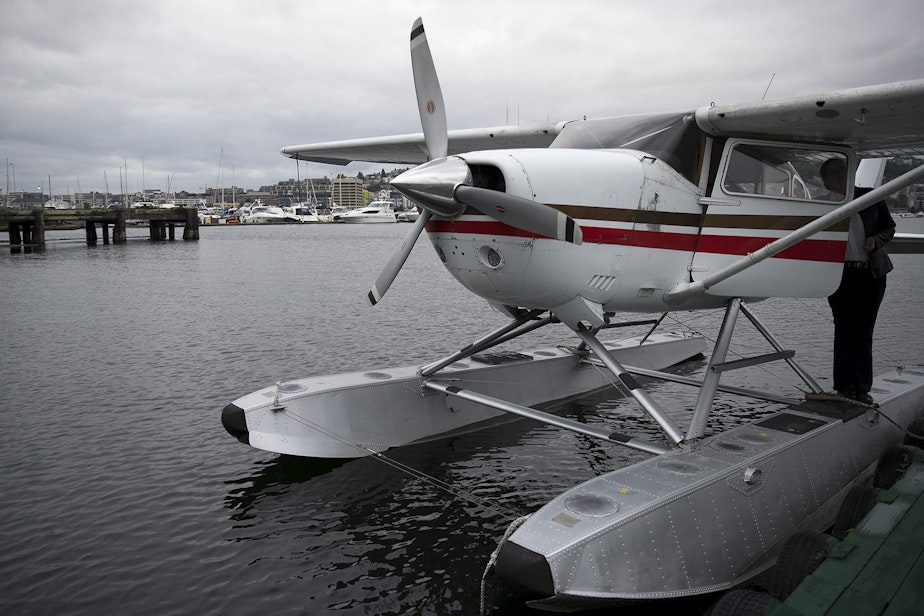Congress moves to mandate leaded fuel sales

The U.S. House of Representatives voted Thursday to require airports to keep selling leaded aviation fuel indefinitely. The small-plane fuel is the biggest source of airborne lead pollution in Washington and nationwide.
Airport neighbors and activists say the mandate, on page 308 of the 841-page legislation reauthorizing the Federal Aviation Administration, puts children’s health at unnecessary risk after the agency approved unleaded fuels for piston-engine planes in 2022.
The House provision requires airports to keep selling any fuel they were selling as of 2018. The U.S. Senate version, still under deliberation, mandates the sale of leaded fuel through 2030 or until a replacement is “widely available.”
“Instead of protecting communities from leaded aviation fuel use, they are opting instead to protect industry from the harmful effects of community activism and organizing,” said activist and South Park resident Christian Poulsen with the Duwamish River Community Coalition.
“I live next to an airport that sells leaded fuel,” said Poulsen, who is raising his two sons near South Seattle’s Boeing Field. “So this is a topic that's really close to home.”
Aviation organizations say they aim to remove lead from aviation fuel by the year 2030 but that local bans on leaded fuel, as passed in California’s Santa Clara County and proposed in New Mexico and Washington state, jeopardize the safety of small-plane travel.
Sponsored
Forty years after the United States phased lead out of gasoline for cars, airplanes with piston engines still puff the brain-damaging heavy metal into the air.
Their leaded exhaust has been linked to higher lead levels in the bloodstreams of children living near airports.
“This is basically a recreational industry, operating almost predominantly in vulnerable communities of color,” Poulsen said.
The nonprofit group Friends of the Earth first petitioned the U.S. Environmental Protection Agency to get the lead out of the fuel used by small planes 17 years ago.
The agency issued a preliminary finding that lead emissions from small planes endanger public health in October 2022, one month after the Federal Aviation Administration approved Oklahoma-based General Aviation Modifications’ new high-octane unleaded fuel for all small planes with piston engines.
Sponsored
Supplies of the new fuel are limited, with General Aviation Modifications predicting it will be more widely available in 2024.
Ordinary motor gasoline—as long as it does not have ethanol added to it—also works for many piston-engine planes.
According to flyunleaded.com, in the Northwest, only three airports in Idaho, one in Oregon (Lebanon State Airport, east of Corvallis), and one in Washington (Grove Field, north of Camas) currently offer unleaded gasoline for piston-engine planes.
Washington State Aviation Alliance President John Dobson could not be reached for comment.
In March, Dobson testified in Olympia against legislation that would require Washington airports to take measures to reduce public exposure to lead from airport operations in 2024.
Sponsored
“The primary source[s] of lead exposing our children include lead-based paint, lead-contaminated drinking water, and lead-contaminated soil,” he said.
According to EPA lead-emissions data for 2020, Auburn Municipal Airport is Washington’s most-polluting airport, followed by Arlington Municipal Airport and King County International Airport (better known as Boeing Field).
Three non-airport sources added more lead to Washington’s air than any individual airport, according to the EPA: the Army’s Yakima Training Center, Ardagh Glass in Seattle, and Joint Base Lewis-McChord.
King County International Airport (better known as Boeing Field) is Washington’s third-largest source of airborne lead pollution, after the Auburn and Arlington airports, according to EPA data for 2020.
Boeing Field has had very few requests from pilots to carry unleaded fuel, according to spokesperson Cameron Satterfield.
In an email, Satterfield said modifying the airport’s “fuel farm” to dispense unleaded as well as leaded fuel would be costly.
“It doesn't make sense to make those investments since we intend to replace the facility in the next couple of years,” Satterfield said.
Sponsored
Boeing Field has begun the process of selecting a developer and operator for a new fuel farm. The airport is requiring that unleaded aviation gasoline be available at the new facility. Construction is expected to take place in 2025.
The vast majority of commercial airplanes burn jet fuel, which does not contain lead, but like all petroleum fuels, emits other pollutants, including planet-heating carbon dioxide.
Correction 9:40 a.m. 8/11/2023: An earlier version incorrectly listed Washington’s largest sources of airborne lead pollution.




